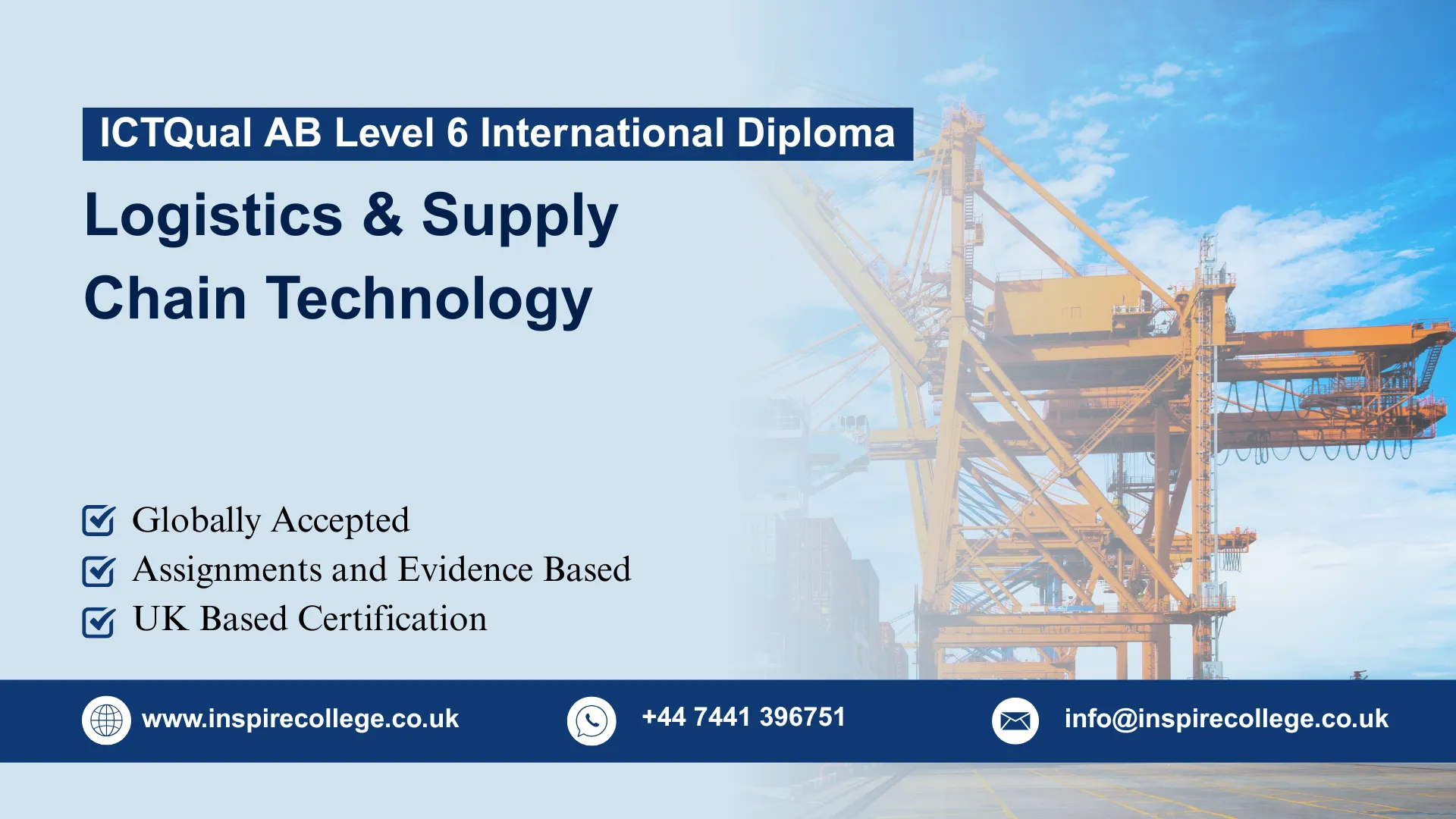
ICTQual AB Level 6 International Diploma in Logistics & Supply Chain Technology
The ICTQual AB Level 6 International Diploma in Logistics & Supply Chain Technology is a globally recognised programme designed for aspiring professionals and experienced practitioners who want to excel in logistics, supply chain management, and operational efficiency. This three-year, 360-credit programme equips learners with the strategic, technical, and managerial skills required to optimise modern supply chains and drive business success in a competitive global market.
The Supply Chain Technology diploma offers a perfect blend of theoretical knowledge and practical application, covering key areas such as inventory management, procurement, warehouse operations, and digital supply chain technologies. Learners will gain a comprehensive understanding of logistics planning, demand forecasting, risk management, and sustainable supply chain practices, preparing them for critical decision-making roles in diverse industries.
Ideal for both fresh graduates and professionals, the programme allows learners to develop advanced problem-solving, analytical, and leadership skills necessary to manage complex supply chain networks. Graduates will be fully equipped to take on roles such as supply chain managers, procurement specialists, operations analysts, and warehouse supervisors.
By enrolling with our ICTQual AB Approved Training Centre, learners gain access to internationally recognised credentials, industry-relevant curriculum, and expert guidance to ensure success. Completing this programme not only enhances career prospects locally in Pakistan but also opens doors to global opportunities in logistics, distribution, and supply chain management.
Prepare to advance your career, streamline operations, and master the latest supply chain technologies with the ICTQual AB Level 6 International Diploma a qualification designed to meet the needs of modern businesses and ambitious professionals worldwide.
To enrol in the ICTQual AB Level 6 International Diploma in Logistics & Supply Chain Technology, learners must meet the following criteria:
- Age Requirement: Learners must be at least 18 years old.
- Educational Background:
- A relevant Level 5 qualification in logistics, supply chain management, business, or a related field is preferred.
- Fresh learners with strong secondary or vocational education in business, commerce, or technical studies are also eligible.
- Professional Experience:
- For experienced learners, a minimum of 3–5 years of verifiable experience in logistics, supply chain, warehousing, transportation, or procurement is advantageous.
- Experience in operational management, inventory control, or distribution networks can support fast-tracked learning options.
- Language Proficiency: Learners must have proficiency in English to engage effectively with course materials, assignments, and assessments.
- Computer Literacy: Basic computer skills, including familiarity with MS Office and digital learning platforms, are required.
- Commitment to Learning: Learners must be dedicated to completing the three-year, 360-credit programme, including theoretical modules, practical assessments, and project work.
These entry requirements ensure that learners are well-prepared to succeed in both the academic and practical components of the programme, equipping them with the knowledge and skills to advance in the global logistics and supply chain industry.
Mandatory Units
This qualification, the ICTQual AB Level 6 International Diploma in Logistics & Supply Chain Technology, consists of 36 mandatory units.
Year 1 – Foundations of Logistics & Supply Chain
- Introduction to Logistics and Supply Chain Management
- Principles of Transport and Distribution
- Inventory Management and Control Systems
- Procurement and Supplier Management
- Basics of Warehouse Operations
- Supply Chain Economics and Policy
- Fundamentals of Risk Management in Logistics
- Business Communication and Professional Ethics
- Introduction to Global Trade and Regulations
- Sustainability and Environmental Management in Supply Chains
- Information Systems in Logistics
- Introduction to Project Management
Year 2 – Applied Logistics Operations & Management
- Advanced Supply Chain Planning and Scheduling
- Freight and Transportation Management
- Procurement Strategy and Supplier Evaluation
- Warehouse and Inventory Optimisation Techniques
- Logistics Technology and Digitalisation
- Safety, Compliance, and Risk Mitigation in Operations
- Logistics Performance Measurement and KPIs
- Lean and Six Sigma Applications in Supply Chains
- Global Logistics and International Trade Management
- Human Resource and Team Management in Logistics
- Applied Case Studies in Supply Chain Management
- Simulation Exercises in Logistics Operations
Year 3 – Strategic Leadership & Advanced Supply Chain Management
- Strategic Supply Chain Management
- Leadership and Decision-Making in Logistics
- Advanced Procurement and Contract Management
- Global Supply Chain Integration and Coordination
- Transport Network Design and Optimisation
- Risk Management and Crisis Response in Supply Chains
- Sustainability, Circular Economy, and Green Logistics
- Emerging Technologies and Innovation in Supply Chains
- Data Analysis and Research Methods for Logistics
- Independent Research Project in Logistics & Supply Chain
- Capstone Project: Applied Strategic Supply Chain Management
- Performance Audit and Continuous Improvement Strategies
Learning Outcomes for the ICTQual AB Level 6 International Diploma in Logistics & Supply Chain Technology 360 Credits – Three Years:
Year 1 – Foundations of Logistics & Supply Chain
Introduction to Logistics and Supply Chain Management
- Understand the core concepts and functions of logistics and supply chain management.
- Analyse the role of logistics in supporting business operations and customer satisfaction.
- Identify key stakeholders and their responsibilities within supply chains.
- Apply basic frameworks to evaluate supply chain efficiency.
Principles of Transport and Distribution
- Explain modes of transport and their impact on distribution efficiency.
- Assess transportation costs, routes, and scheduling for optimal delivery.
- Apply principles of distribution planning and network management.
- Understand legal and regulatory requirements in transportation.
Inventory Management and Control Systems
- Demonstrate methods for effective inventory control and stock management.
- Apply forecasting techniques to maintain optimal stock levels.
- Evaluate inventory performance using KPIs and control systems.
- Identify the impact of inventory decisions on supply chain efficiency.
Procurement and Supplier Management
- Understand procurement processes and supplier relationship management.
- Evaluate supplier performance using defined metrics.
- Apply negotiation and contract management principles.
- Develop strategies to enhance procurement efficiency.
Basics of Warehouse Operations
- Explain warehouse design, layout, and operational procedures.
- Demonstrate best practices in material handling and storage.
- Apply safety standards and operational policies within warehouse settings.
- Evaluate warehouse performance and suggest improvements.
Supply Chain Economics and Policy
- Understand economic principles affecting supply chains.
- Analyse the impact of national and international trade policies.
- Apply cost-benefit and financial analysis to supply chain decisions.
- Evaluate policy changes on operational efficiency and competitiveness.
Fundamentals of Risk Management in Logistics
- Identify potential risks in supply chain operations.
- Apply risk assessment and mitigation strategies.
- Develop contingency and business continuity plans.
- Understand compliance requirements and safety protocols.
Business Communication and Professional Ethics
- Demonstrate effective written and verbal communication in logistics contexts.
- Apply professional ethics in supply chain decision-making.
- Develop negotiation and presentation skills for stakeholder engagement.
- Analyse ethical dilemmas and propose responsible solutions.
Introduction to Global Trade and Regulations
- Understand international trade principles, agreements, and regulations.
- Analyse the impact of customs, tariffs, and trade compliance on supply chains.
- Apply import/export documentation and compliance requirements.
- Evaluate global trade challenges and opportunities.
Sustainability and Environmental Management in Supply Chains
- Understand sustainable practices and green logistics principles.
- Analyse environmental impacts of supply chain activities.
- Apply sustainability strategies to logistics operations.
- Develop initiatives to reduce carbon footprint and waste.
Information Systems in Logistics
- Understand the role of information systems in logistics and supply chain management.
- Apply digital tools for inventory, procurement, and distribution management.
- Analyse logistics data for operational decision-making.
- Evaluate technology solutions for efficiency improvements.
Introduction to Project Management
- Understand project management principles and methodologies.
- Apply planning, scheduling, and resource allocation techniques.
- Monitor project progress and identify potential risks.
- Evaluate project outcomes and report findings effectively.
Year 2 – Applied Logistics Operations & Management
Advanced Supply Chain Planning and Scheduling
- Develop advanced supply chain planning models and strategies.
- Apply scheduling techniques to optimise operational efficiency.
- Analyse demand and supply alignment for effective resource allocation.
- Evaluate performance and adjust plans to improve outcomes.
Freight and Transportation Management
- Plan and manage freight operations across various transport modes.
- Apply cost analysis and route optimisation techniques.
- Understand regulatory compliance and safety in transportation.
- Assess performance metrics for freight operations.
Procurement Strategy and Supplier Evaluation
- Design procurement strategies aligned with organisational goals.
- Evaluate supplier capabilities and performance.
- Apply supplier selection and risk management techniques.
- Develop improvement plans for procurement processes.
Warehouse and Inventory Optimisation Techniques
- Apply advanced techniques for inventory management and warehouse efficiency.
- Implement warehouse layout optimisation for productivity gains.
- Analyse inventory turnover and stockholding strategies.
- Recommend solutions for reducing operational costs.
Logistics Technology and Digitalisation
- Explore digital solutions and automation in logistics operations.
- Implement technology for tracking, monitoring, and optimisation.
- Evaluate the impact of digitalisation on efficiency and decision-making.
- Analyse emerging logistics technologies and trends.
Safety, Compliance, and Risk Mitigation in Operations
- Identify operational hazards and safety requirements.
- Apply risk management and mitigation strategies.
- Ensure compliance with local and international regulations.
- Develop plans to improve workplace safety and reduce incidents.
Logistics Performance Measurement and KPIs
- Define and apply key performance indicators in logistics operations.
- Analyse operational data to evaluate efficiency and effectiveness.
- Recommend improvements based on KPI analysis.
- Align performance metrics with organisational objectives.
Lean and Six Sigma Applications in Supply Chains
- Understand Lean and Six Sigma principles in logistics.
- Apply process improvement techniques to reduce waste and increase efficiency.
- Conduct analysis to identify bottlenecks and implement solutions.
- Evaluate outcomes of Lean and Six Sigma initiatives.
Global Logistics and International Trade Management
- Analyse international logistics networks and trade operations.
- Apply compliance standards for global supply chains.
- Develop strategies to manage global transport, customs, and trade risks.
- Evaluate international trade opportunities and challenges.
Human Resource and Team Management in Logistics
- Understand HR principles in logistics organisations.
- Develop effective team management and leadership skills.
- Apply conflict resolution and motivation techniques.
- Evaluate workforce performance and plan training needs.
Applied Case Studies in Supply Chain Management
- Analyse real-world logistics and supply chain scenarios.
- Apply theoretical knowledge to practical problem-solving.
- Develop strategic recommendations for operational improvements.
- Evaluate outcomes of implemented solutions.
Simulation Exercises in Logistics Operations
- Engage in simulated logistics operations to test planning and decision-making skills.
- Apply analytical and operational strategies in controlled scenarios.
- Assess efficiency, risk, and outcomes of simulated operations.
- Develop problem-solving and strategic thinking skills.
Year 3 – Strategic Leadership & Advanced Supply Chain Management
Strategic Supply Chain Management
- Develop and implement supply chain strategies aligned with business objectives.
- Analyse global supply chain integration and performance.
- Evaluate strategic risks and opportunities in supply chain operations.
- Recommend long-term improvement plans for organisational competitiveness.
Leadership and Decision-Making in Logistics
- Apply leadership theories and decision-making frameworks in logistics contexts.
- Manage teams and resources to achieve operational goals.
- Analyse complex situations and make informed decisions.
- Evaluate leadership effectiveness and adjust strategies.
Advanced Procurement and Contract Management
- Manage procurement contracts and supplier relationships strategically.
- Apply negotiation techniques for cost savings and value creation.
- Evaluate compliance, risk, and performance in procurement processes.
- Develop policies to improve procurement efficiency and accountability.
Global Supply Chain Integration and Coordination
- Analyse end-to-end global supply chain processes.
- Implement integration strategies across suppliers, manufacturers, and distributors.
- Evaluate coordination mechanisms to optimise flow and reduce costs.
- Develop solutions for cross-border logistics challenges.
Transport Network Design and Optimisation
- Design efficient transport networks for domestic and international logistics.
- Apply optimisation techniques to reduce costs and improve service levels.
- Analyse traffic, route, and capacity data to enhance performance.
- Evaluate network efficiency and suggest improvements.
Risk Management and Crisis Response in Supply Chains
- Identify strategic, operational, and financial risks in supply chains.
- Develop crisis management and business continuity plans.
- Apply risk mitigation strategies across global supply chains.
- Evaluate post-crisis performance and recommend improvements.
Sustainability, Circular Economy, and Green Logistics
- Apply sustainable practices in logistics and supply chain operations.
- Analyse opportunities for circular economy and resource optimisation.
- Develop green logistics strategies to reduce environmental impact.
- Evaluate sustainability initiatives for compliance and efficiency.
Emerging Technologies and Innovation in Supply Chains
- Explore innovations such as IoT, AI, blockchain, and robotics in logistics.
- Apply technology to improve supply chain efficiency and transparency.
- Analyse the impact of digital transformation on global logistics.
- Recommend technology-driven solutions for business challenges.
Data Analysis and Research Methods for Logistics
- Apply quantitative and qualitative research methods to logistics issues.
- Analyse data to support decision-making and strategy development.
- Interpret supply chain metrics and performance reports.
- Present findings in professional and actionable formats.
Independent Research Project in Logistics & Supply Chain
- Conduct independent research on a relevant logistics topic.
- Apply analytical and research skills to explore practical solutions.
- Prepare a structured report with findings and recommendations.
- Demonstrate critical thinking and evidence-based decision-making.
Capstone Project: Applied Strategic Supply Chain Management
- Develop and implement a comprehensive supply chain project.
- Integrate theoretical knowledge and practical skills to solve real-world challenges.
- Analyse results and measure project impact on performance and efficiency.
- Present project outcomes professionally to stakeholders.
Performance Audit and Continuous Improvement Strategies
- Conduct performance audits of logistics operations.
- Identify areas for process improvement and operational excellence.
- Develop continuous improvement plans aligned with strategic goals.
- Evaluate outcomes and implement best practices across supply chain functions.
The programme is designed to cater to a broad spectrum of learners, from fresh entrants in logistics to experienced professionals seeking career advancement.
1. Fresh Graduates and Entry-Level Learners
- Individuals aged 18 years or older with a strong interest in Advanced Logistics Diploma, and operational efficiency.
- Learners who have completed relevant secondary or vocational education and want to gain an internationally recognised qualification.
- Candidates seeking to build a solid foundation in procurement, warehouse operations, transportation, and supply chain principles.
- Learners motivated to develop practical and analytical skills applicable to real-world Inventory Management scenarios.
- Individuals aiming to enter professional roles in logistics, warehousing, transport coordination, or supply chain management.
2. Early Career Professionals
- Individuals already working in logistics, transport, warehousing, or procurement roles seeking advanced knowledge and formal qualifications.
- Professionals looking to specialise in areas such as supply chain optimisation, digital logistics, or global trade management.
- Learners aiming to enhance their career prospects, improve operational efficiency, and develop leadership skills within Inventory Management teams.
- Candidates committed to applying both theoretical knowledge and practical skills in real-world operations for career growth.
3. Experienced Logistics and Supply Chain Professionals
- Professionals with 3–5 years or more of experience in logistics, warehousing, transportation, procurement, or supply chain management.
- Individuals aiming to formalise their experience with an internationally recognised Level 6 diploma.
- Learners seeking to progress into strategic, managerial, or consultancy roles within supply chain.
- Professionals looking to expand expertise in risk management, sustainability, global trade, and technology-driven logistics solutions.
4. Career Switchers and Aspiring Specialists
- Individuals from related fields such as business, commerce, operations, or engineering seeking to transition into supply chain management.
- Learners passionate about supply chains, transportation, and operational excellence, seeking structured training to develop industry-ready skills.
- Candidates motivated to combine theoretical knowledge with hands-on practice to achieve professional competence.
Key Attributes of Ideal Learners
- Commitment to completing the three-year, 360-credit programme.
- Strong problem-solving, analytical, and decision-making skills.
- Effective communication and teamwork abilities for collaborative projects and operational environments.
- Interest in staying updated with emerging logistics technologies, global trade regulations, and sustainable supply chain practices.
- Dedication to maintaining safety, quality, and ethical standards in all logistics and supply chain operations.
As an ICTQual AB Approved Training Centre, we offer learners two flexible pathways to achieve the Level 6 International Diploma in Logistics & Supply Chain Technology. All learners must register with our centre to enrol and access course materials.
Route 1 – Experienced Professionals
Designed for learners with at least 6 years of verifiable professional experience in supply chain management, procurement, transportation, or related fields. Key features:
- Submission of evidence demonstrating prior work experience, responsibilities, and achievements.
- Verification of existing skills and knowledge against the diploma’s learning outcomes by our centre.
- Targeted guidance or additional training provided if gaps are identified.
- Successful verification may lead to diploma certification without completing all 36 assignments, enabling fast-tracked recognition of professional expertise.
Route 2 – Fresh Learners
Designed for learners without prior professional experience in supply chain management. Key features:
- Completion of the full three-year, 360-credit programme, including all 36 assignments, case studies, practical assessments, and projects.
- Assessments structured to demonstrate both theoretical knowledge and practical application in real-world logistics scenarios.
- Upon successful completion, learners are awarded the ICTQual AB Level 6 International Diploma .
Both routes provide a globally recognised, industry-relevant qualification, enabling learners to:
- Validate prior professional experience (Route 1)
- Gain comprehensive logistics and supply chain expertise to advance careers in operations, procurement, warehousing, and transport management (Route 2)
Register Now
FAQs for ICTQual AB Level 6 International Diploma in Logistics & Supply Chain Technology






